The recent signing of Nigeria’s 2024 budget by President Bola Tinubu has stirred both optimism and apprehension as the country seeks an economic revival amid continued challenges.
The two arms of the National Assembly passed the 2024 appropriation bill and increased its size from N27.5 trillion proposed by Tinubu to N28.7 trillion.
The top priorities of the budget are defence and internal security, job creation, macroeconomic stability, improved investment environment, human capital development, poverty reduction, and social security.
Some of the key estimates are capital expenditure, N10 trillion; recurrent expenditure, N8.8 trillion; debt service, N8.2 trillion, and statutory transfers, N1.7 trillion.
However, its feasibility remains in doubt given global economic headwinds and Nigeria’s fiscal constraints.
Of course, budgets are not designed to be perfect no matter how well-intentioned the proposal is.
They are inherently fallible, especially in today’s unstable and constantly changing social, political and economic climate, where there is no telling what next could alter the best of plans and reset all that has been proposed. The variables, increasing as they are, are also radical and erratic.
As such, many thinkers, strategists and analysts would expect that a basic in setting up budget proposals is a well thought out, data-driven and as realistic as possible, the prospect of these rapidly changing times and instabilities.
As global events (especially with the economic consolidation of the BRICS nations) in the last decade have shown, the need to design a thoroughly thought-out budget which aligns with global realities becomes manifestly trite.
But that is just one end of the discussion as the political will and financial discipline to implement the budget in the overall interest of the people ought to be at the core. This is more so because the realization of the budget would require sacrifices from the led no doubt, but more critically from the leaders.
Without this essential component, we will yet again have a failed budget or at best a repeat of the mediocre outcomes we have had for decades.
As much as this year’s budget appears to be well thought out, the projections in light of prevailing economic realities do raise concerns.
Some financial experts are not too optimistic about the budget. For some of them, an increase in the size of the 2024 budget by the National Assembly will render the inflation rate projection of 21.4 percent for 2024 unrealistic.
Clearly such a move is projected to have adverse implications for the inflation and interest rate environment in 2024.
They argue that it is most likely the exchange rate will be the major cause of wide budget variances in the 2024 budget on account of Nigerian Autonomous Foreign Exchange Market (NAFEM) operations.
Others have hinged the 2024 economic performance on three main variables including policy changes, 2024 budget efficiency and ‘miracles’.
They aver that economic performance at the end of 2023 with low GDP growth, high exchange rate, high interest rates, high energy cost, and an unfriendly environment for doing business leaves much to be desired.
Some argue that the projected Gross Domestic Product (GDP) growth is lower when compared to the population growth rate.
In our view, these projections are not strange when matched with the rising huge dormant human resource on the one hand and the exodus of scarce expertise to foreign lands as seen in the ‘japa’ syndrome.
Regrettably, the revenue system is also fraught with leakages and wastages, which seems to have become an industry in itself.
While the quest to expand the tax net has remained a lethargic exercise for administrations over the years, the skepticism surrounding the use of public funds by the political elite has not helped the message for tax payment as a means for funding major projects.
That is not forgetting the most unconducive environment for medium and small businesses to thrive.
While borrowing of all kinds has since become the mainstay of revenue generation by the government, there is diminishing faith in what these huge borrowings have been used for.
However, if it’s any compensation, BMI, a Fitch Solutions company, in its recent forecast, indicated that Nigeria’s real GDP growth will increase modestly to 2.9% in 2024, up from 2.4% in 2023.
According to the report, the operational start of the Dangote refinery in Q1 2024 will lead to a sharp reduction in imports and increase the country’s trade surplus, providing tailwinds to economic growth.
The 2024 budget thus offers Nigeria both a warning and cautious hope. Without fundamental reforms, its spending risks becoming just another ritual.
But with prudence, accountability and strategic investments, Nigeria can still pivot its economy for an inclusive and sustainable future. This potential remains compelling, but its fulfillment depends on the choices ahead.



